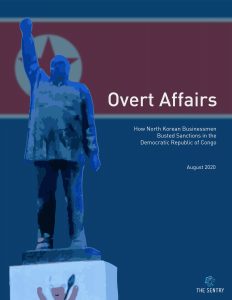 Download the full report.
Download the full report.
 Download the one-page summary.
Download the one-page summary.
> Lire le rapport en français.
In 2018, two North Korean businessmen formed a construction services firm in the Democratic Republic of Congo (DRC) and engaged in activities that appear to violate sanctions adopted by the European Union, the United Nations, and the United States. Despite strict international prohibitions, these individuals opened a bank account for their company, Congo Aconde, and undertook construction projects in the country. One such project involved erecting statues in a remote provincial capital, a type of construction explicitly forbidden by UN sanctions adopted in 2016. In another apparent violation of UN sanctions, Congolese government funds reportedly served to pay for the statues. Notably, Congo Aconde’s activities also gained the attention of several prominent Congolese politicians linked to former President Joseph Kabila’s political party, and some of these politicians even rubbed shoulders with the North Korean businessmen.
“Affaires risquées”
Consulter le rapport en français.
The Sentry’s investigation raises significant questions about the enforcement of sanctions on North Korea and demonstrates apparent failures at multiple levels of the Congolese government and by several banks to conduct proper due diligence on Congo Aconde. Those same failures allowed the company to undertake prohibited activities in the DRC and posed great risk to the international financial system. Specifically, Congo Aconde obtained a US dollar-denominated account at the DRC affiliate of Afriland First Bank, an institution headquartered in Cameroon. The account enabled the company to move funds globally via BMCE Bank International, identified in evidence reviewed by The Sentry as the banking partner designated to process US dollar and euro transactions for Congo Aconde’s account in the DRC. Sanctions programs on North Korea focus heavily on disrupting access to the international financial system because of the danger that revenue generated overseas could ultimately be used to fund the country’s nuclear weapons program. As a result, Congo Aconde’s access to banking services is more than a simple lapse. This access could represent a threat to international peace and security.
Congo Aconde serves as a clarion call for banks, governments, and multilateral institutions regarding sanctions risks in the DRC. Weak internal controls and oversight mechanisms in the DRC make it a fertile ground for those seeking to evade sanctions. These frailties put the DRC’s banking sector and the broader economy in significant danger.
Letter from the Congolese Bankers Association regarding the report and de-risking.
Key Recommendations
In the wake of its investigation, The Sentry is making the following key recommendations, the full text of which appears at the end of this report.
United States:
- Amend the risk advisory. The US Treasury Department’s Financial Crimes Enforcement Network (FinCEN) should amend the existing advisory on the illicit finance threat emanating from North Korea to include risks of doing business with certain parts of the DRC’s banking sector.
International community:
- Address anti-money laundering/countering the financing of terrorism (AML/CFT) implementation and shortfalls. The US Treasury Department, the International Monetary Fund (IMF), the World Bank and other international partners should help banks in the country implement AML/CFT standards and urge the DRC’s central bank to address gaps in AML legislation. The US Treasury Department’s Office of Technical Assistance and the IMF should work with the DRC’s Finance Ministry to address gaps in legislation and policy implementation. International partners should pressure their DRC government interlocutors to fund and empower the financial intelligence unit and consider providing necessary technical support to the unit.
Global banks and other relevant financial institutions:
- Conduct enhanced due diligence. Global banks should conduct enhanced due diligence on the transactions of certain banks operating in the DRC. Afriland First Bank, BMCE Bank International, and any other correspondent banks that may have processed transactions for Congo Aconde should comply with UN and US sanctions and freeze any accounts controlled by Congo Aconde and its North Korean owners.
DRC government:
- Empower the DRC financial intelligence unit. The Congolese government should empower its financial intelligence unit, the Cellule nationale des renseignements financiers (CENAREF), to conduct independent and thorough investigations of suspicious financial activities. The DRC government should also join the Egmont Group, the international consortium of financial intelligence units that promote information sharing.

